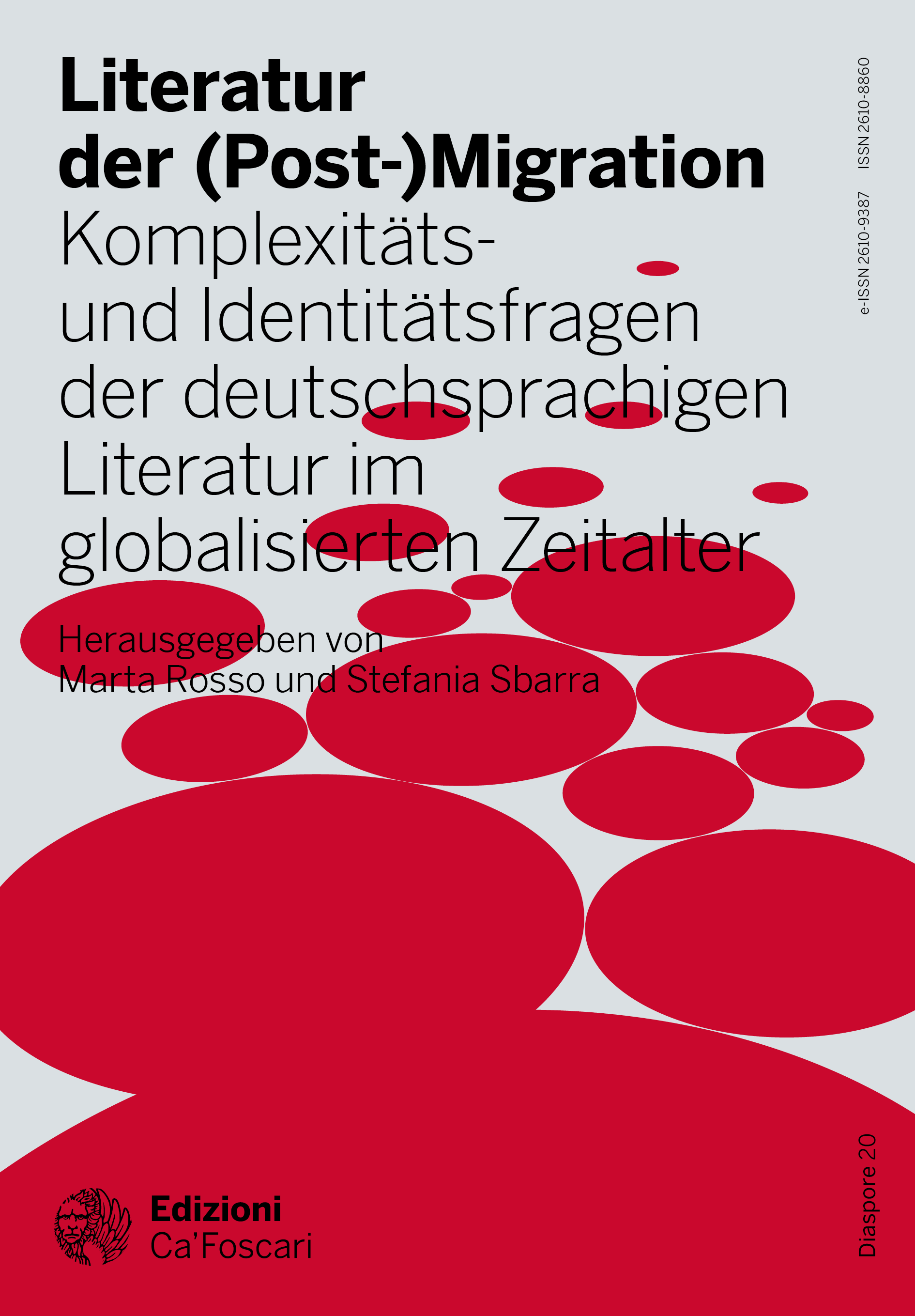Series |
Diaspore
Volume 20 | Edited book | Literature of (Post-)Migration
Literature of (Post-)Migration
Questions of Complexity and Identity in German-Language Literature in a Globalised Age
open access | peer reviewed-
edited by
- Marta Rosso - Università Ca’ Foscari Venezia, Italia - email
- Stefania Sbarra - Università Ca’ Foscari Venezia, Italia - email orcid profile
Abstract
This volume brings together contributions from the international conference "Literatur zwischen Migration und Globalisierung. Formen der Komplexität in der deutschsprachigen Gegenwartsliteratur", which took place in May 2022 at Ca’ Foscari University of Venice. It aims to reflect on the literature of migration of the last thirty years and to situate it in the increasingly complex world of our globalised present, crossed by the movements of people and cultures.
The reflections of the individual essays take, as point of departure, the common observation that the literature of (post)migration is characterised by careful linguistic research and radical aesthetic experimentation, capable of interrogating our intercultural reality and of restoring a likewise complex image of the world and of society. The contributors that have converged in the present volume focus on examining the issues of complexity and identity, which, in the texts they discuss, are inextricably linked to the narration of spaces, borders, and movements. In the works of Uljana Wolf, Olga Grjasnowa, Emine Sevgi Özdamar, Michael Stavarič, Terézia Mora, Emilia Smechowski, Feridun Zaimoglu, and Sasha Marianna Salzmann, the literary language variously becomes a means to explore new possibilities of meaning, to recover what has been erased, to reconstruct the biographical stratifications inscribed in the bodies, to feel at home in a foreign world, to criticise the historical memory of society, to register bilingualisms, conflicts, and ‘in-betweenness’, and hence to narrate the new forms of identity, of hybrid identity, of postidentity, and of gender identity that are formed as a result of first, second, or third generation migrations and in correspondence with precise geographical and human spaces.
Keywords Austrian literature • Migration • Identität • German-Polish relations • Geschichts- und Erinnerungskultur • Sasha Marianna Salzmann • Postmigrant • Kontrolle • Wir Strebermigranten • Narrative discourse • Trauma and literature • Multikulturalismus • Multiculturalism • Postmigration • Space and literature • Körper • Berlin Republic • Grenze • Ellis Island • German literature • Body • Gender • Control • Biography • Normalisation • Mother tongue • “Normalisierung” • Postmigrant literature • Memory culture • Complexity • Postmigrantische Literatur • Rückkehr nach Polen • Alle Tage • Poetic speech act • Emilia Smechowski • Multilingualism • Postmigrantisch • Identity • Intercultural literature • Intersectionality • Olga Grjasnowa • Postmigrantische Gesellschaft • “Berliner Republik” • Komplexität • Identity and alterity • Michael Stavarič • Postmigrant society • Tanz • Dance • Trauma • Postmonolingualism • Sexuality • Border • Postidentity
Permalink http://doi.org/10.30687/978-88-6969-734-0 | e-ISBN 978-88-6969-734-0 | Published June 16, 2023 | Language de
Copyright © 2023 Marta Rosso, Stefania Sbarra. This is an open-access work distributed under the terms of the Creative Commons Attribution License (CC BY). The use, distribution or reproduction is permitted, provided that the original author(s) and the copyright owner(s) are credited and that the original publication is cited, in accordance with accepted academic practice. The license allows for commercial use. No use, distribution or reproduction is permitted which does not comply with these terms.
- Einleitung
- June 16, 2023
-
Migration, Checkpoints und Komplexitätsregimes
Uljana Wolfs Lyrik einer ‚haltlosen Komplexität‘ - June 16, 2023
-
Globalisierte Körper
Biografie, Körper und Geschlecht in Olga Grjasnowas Roman Die juristische Unschärfe einer Ehe - June 16, 2023
-
„Wie soll ich mit einem schweigenden Körper laufen?“
Sprache, Sexualität und Poesie: Emine Sevgi Özdamars „Mutterzunge“ und „Großvaterzunge“ - June 16, 2023
- Grenzüberschreitungen in Stavaričs Prosaminiaturen Nkaah und seine Experimente (nicht nur) am lebenden Objekt
- June 16, 2023
-
Eine Welt ohne Eigenes
Konstruktion und Erfahrung der Fremdheit in Terézia Moras Alle Tage - June 16, 2023
-
Aus dem Nichts ins Nichts
Zu Fatih Akins Aus dem Nichts und Feridun Zaimoglus German Amok - June 16, 2023
- Kein „festgeschriebenes Я“
- June 16, 2023
